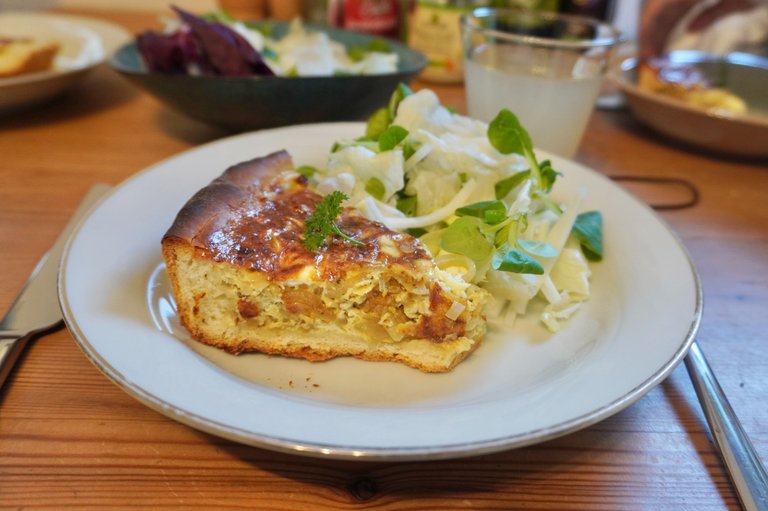
Reading about gourmet posts is always fun, and detailed posts about cooking steps are helpful. But personally, I really enjoy posts that touch on the cultural side of food even without a recipe or with a really rough recipe. That’s what inspired me to create the Food & Culture community. Though I haven’t been very active in maintaining or posting there ... like other one, Bread Bakers 😅
Since I recently had a chance to make a meal with a cultural twist, I wanted to share it with you and to the Food & Culture community.
In September, you can find Federweißer, a young wine that is still fermenting, in Germany. Because it’s actively fermenting, the bottle has a small hole in the cap, so you need to carry it upright to prevent it from leaking. This makes it a unique experience — Federweißer is only available in limited regions during this time of year.
I’ve been seeing it in stores but September was quite busy, so I managed to buy a bottle last week.
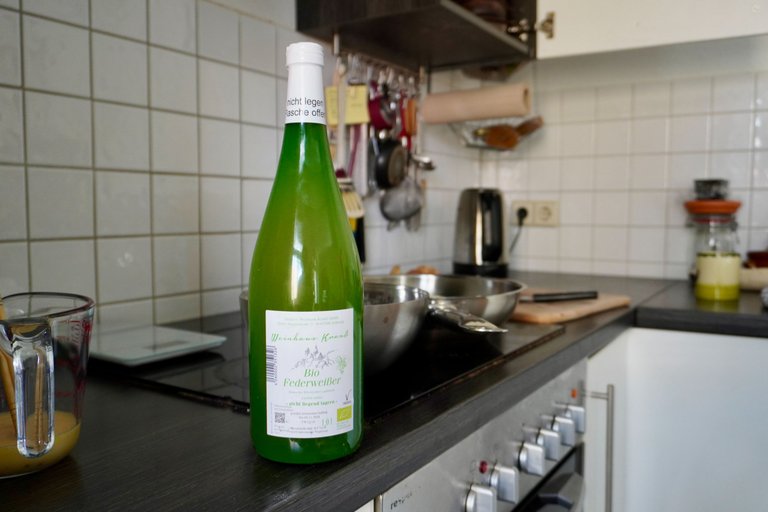
It tastes young and sweet, with a refreshing apple juice-like flavor. I don't drink much sweet drinks but I like it. Even I drink it with food, which I rarely do with sweet drinks.
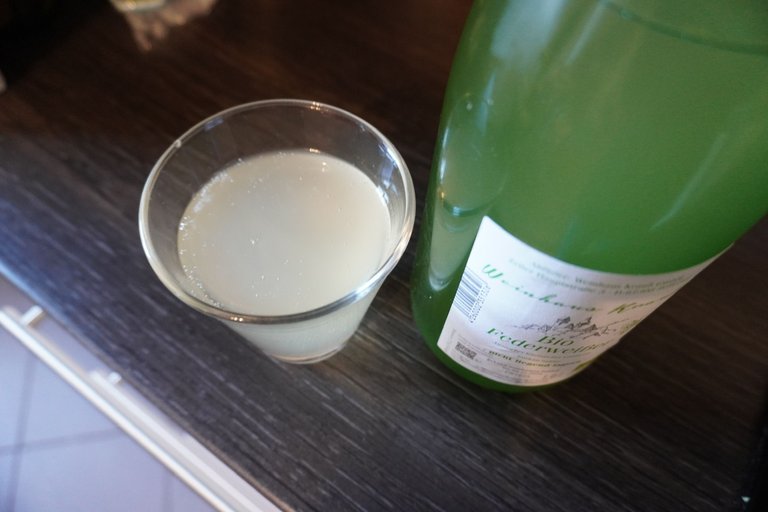
Since the weather has cooled down early this year, I thought it would be nice to pair Federweißer with something warm and comforting, like one of Germany’s classic autumn dishes: Zwiebelkuchen (onion cake).
In simple terms, it’s like an onion quiche, but instead of using cream in the egg mixture, it calls for Schmand—a type of sour cream commonly used in Germany. Also, unlike quiche, where the crust is made with butter and flour, the dough for Zwiebelkuchen is yeast-based, like bread. This definitely feels like the influence of Germany, the land of bread 🇩🇪
I followed a recipe from a German food magazine called Essen und Trinken. Since I prefer a vegetarian version, I skipped the bacon, but it’s still delicious without it. Mushrooms would be a great addition too.
Klassischer Zwiebelkuchen Recipe - [ESSEN UND TRINKEN]
You need a lot of onions for Zwiebelkuchen. I used 500g of onions. While the dough was rising, I slowly sautéed the onion.
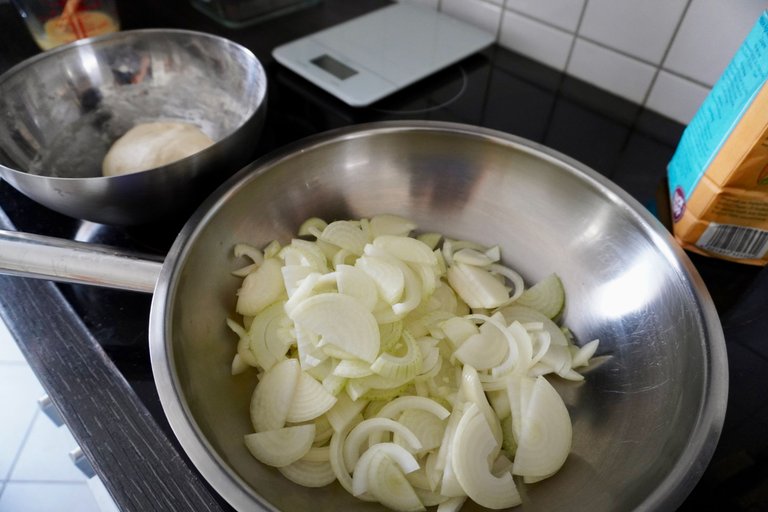
The egg mixture is super simple—just mix eggs with Schmand. Grease a baking dish, spread the dough, add the onions, pour the egg mixture on top, and sprinkle with cheese. Bake it in the oven for about 30 minutes, and it’s done!
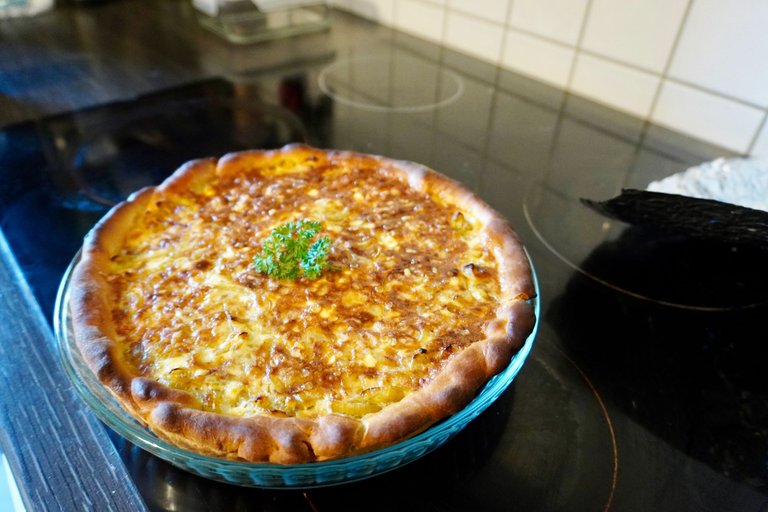
Serve it with a fresh salad made with Feldsalat (lamb’s lettuce), a classic autumn/winter leaves in Germany, and don’t forget to enjoy it with Federweißer or ... of course beer 🍻
I really appreciate the joy of seasonal, local food. What dishes do you enjoy during this season in your part of the world? I’d love to read about it 😊
おいしい外食の投稿は見ていて楽しいし、調理の手順を詳細に説明した投稿は実際に作るときに役立つのですが、個人的には文化的な側面に触れた食事の記事を読むのが好きです。そんな思いから作ったのがFood & Cultureコミュニティです。全然メンテナンスも投稿もできていませんが・・・ 😅 ちょうどFood & Cultureな夕食を作る機会があったので投稿します。
9月に入るとドイツではFederweißer(フェーダーワイサー)というまだ発酵が進んでいる若いワインが出回ります。発酵が進んでいるのでボトルの口の封には小さな穴が空いていて、漏れないようにまっすぐ持って帰ります。そんな状態なので、ドイツで、さらにこの時期にしか味わえない楽しみなお酒でもあります。
お店に並んでいるなあ、飲みたいなあと思っていたのですが、9月はばたばたでなかなかチャンスがなく、ようやく一本買ってきました。

味はというと、若々しくて甘い、リンゴジュースのような爽やかな味わいです。

今年は涼しくなるのが早くて、夏の爽やかな料理というよりも、秋の温かい料理をFederweißerに合わせたいなと思い、ドイツの秋の定番料理の一つZwiebelkuchen(ツヴィーベルクーヘン、たまねぎケーキ)を焼くことにしました。言ってしまうと、たまねぎのキッシュなのですが、卵液には生クリームではなくシュマンドというドイツや東ヨーロッパでよく使われるサワークリームのような乳製品を使います。また、キッシュの生地はバターと小麦粉でイーストは使わずに作りますが、Zwiebelkuchenの生地はイーストを入れるパン生地です。パンの国ドイツな感じがします🇩🇪
今回はEssen und Trinkenというドイツのグルメ雑誌のレシピで作りました。ベジタリアンということで、ベーコンは抜きました。抜いても普通においしいですよ。きのこを入れてもあいます。
Klassischer Zwiebelkuchen Rezept - [ESSEN UND TRINKEN]
Zwiebelkuchenには大量の玉ねぎを使います。今回はたまねぎ500gを使いました。生地を発行させている横でどんどん炒めていきます。

卵液は簡単で、卵とシュマンドを混ぜるだけです。油を塗ったグラタンザラに生地を敷いて、玉ねぎを入れて、卵液を注ぎます。その上にチーズをトッピングしてオーブンで30分ほど焼いたら出来上がり。

秋冬のサラダの定番、Feldsalat(ノヂシャ)を使ったサラダを添えて召し上がれ!Federweißerやビールもお忘れなく🍻

季節の地域の料理を楽しむって改めていいですね。みなさんが住んでいる地域でこの季節には何を食べますか?読んでみたいです😊

